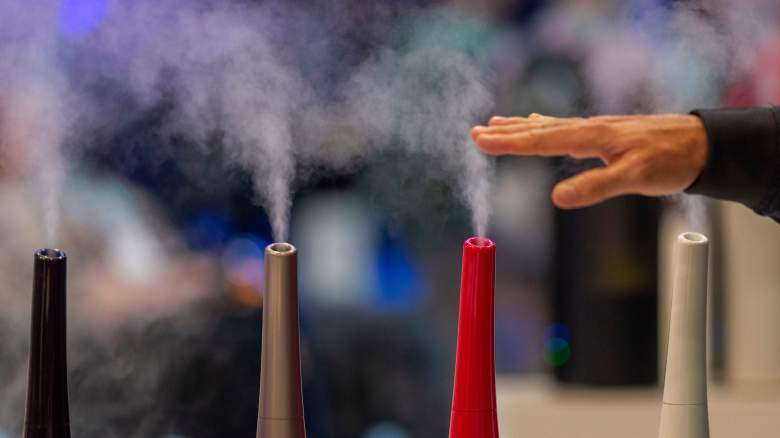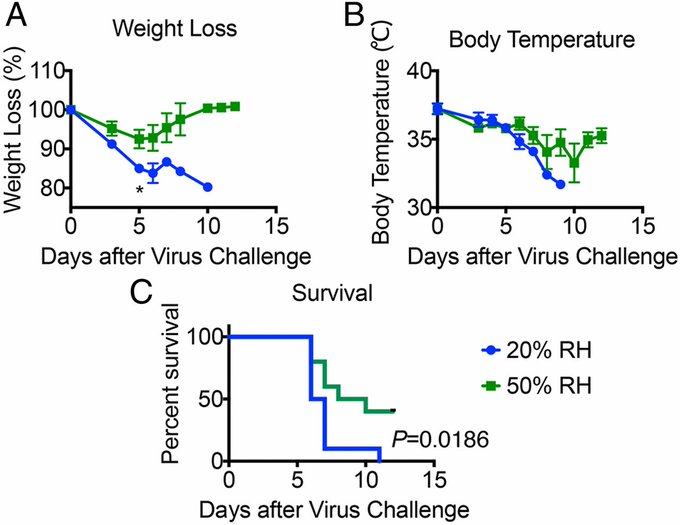
As the coronavirus pandemic continues, concerned people around the world are seeking ways to protect themselves from the virus. Online, humidifier sales are increasing as speculation spreads that they can potentially prevent COVID-19 from spreading in your home and reduce respiratory symptoms for those who have tested positive for the virus.
The CDC recommends people suffering from a common human coronavirus “use a room humidifier or take a hot shower to help ease” their respiratory symptoms. It is important to note that this advice is for common human coronaviruses and not COVID-19 (also referred to in the article as 2019 novel coronavirus).
According to NPR, virologist Seema Lakdawala included the use of a humidifier on her list of tips for preventing coronavirus spread within the home. “Keeping the humidity up will keep the protective membranes in your nose from drying out, which makes them less effective as they try to keep pathogens out. Mid-range humidity also appears to cause some viruses to decay faster,” Lakdawala advised.
Dr. Oz told Fox News that one of his “coronavirus survival guide tips” is to “improve your air quality by using a humidifier because viruses dislike humid air.”
Per the CDC, symptoms of COVID-19 include fever, cough and shortness of breath. To prevent the spread of coronavirus in your home, they recommend consistent, thorough cleaning of surfaces and hands. Increasing home humidity is not included on their list of tips to “protect yourself” and “prevent getting sick.”
While it has not been proven that humidifiers can keep the novel coronavirus from spreading, they do have known health benefits. Healthline explains that humidifiers function by adding moisture to the air to prevent irritating dryness and can be used to remedy dry skin, sinus congestion and headaches, dry throat, nose irritation, bloody noses, irritated vocal cords, dry cough and cracked lips.
According to the Mayo Clinic, cool-air humidifiers can ease breathing and skin symptoms caused by dry air and “may help ease symptoms of a cold or other respiratory condition.” They also warn, however, that humidifiers can actually cause illness if they aren’t kept clean or if the humidity levels are kept too high. Healthline affirms that overusing your humidifier could worsen respiratory problems.
Yale Professor Akiko Iwasaki’s Research Concluded That Virus Outbreak Correlates With a Decrease in Air Humidity
In a research study for the Proceedings of the National Academy of Sciences of the United States of America (PNAS.org), Yale Professor Akiko Iwasaki conducted a research experiment with mice to investigate the impact of air humidity on viral transmissions and the host’s response to the virus.
The result of the May 2019 study concluded that “Low Ambient Humidity Leads to More Severe Disease in Mx1 Congenic Mice.” On Twitter in February 2020, as the coronavirus pandemic arose as a global threat, Iwasaki tweeted the original study, explaining, “Our study in mice shows the impact of humidity on hosts’ ability to fight respiratory virus infection.” The study suggests that in the winter months, when there is an increase in indoor heating that causes a decrease in air humidity, mucociliary clearance and innate antiviral immunity is reduced. This, Iwasaki says, contributes directly to more virus present in the lungs and a higher mortality rate.
Agreeing with Iwasaki’s conclusion, Dr. Nancy Gough from Johns Hopkins University said, “When the temperature drops, the heat comes on. This reduces the amount of humidity in the air. It turns out this isn’t just uncomfortable; it also impairs the innate immune system in the respiratory tract” (per Globe Newswire).
Research Suggests COVID-19 Reproduces at a Slower Rate in Warmer, More Humid Climates
According to Advisory.com, researchers at Beihang University and Tsinghua University concluded that “[h]igh temperature and high relative humidity [can] significantly reduce the transmission of COVID-19.” This means “the arrival of summer and rainy season in the Northern Hemisphere” could reduce the transmission of a disease like COVID-19.
According to Cleveland.com, the suggestion that humidity could prevent the spread of coronavirus and alleviate symptoms is based on studies connecting influenza and humidity. Referencing influenza, Dr. Harry Kestler said, “As the humidity goes down, the virus actually does better. So in the winter, you wonder ‘Why is it always a winter thing?’ In homes, in the winter, it tends to be dry.”
As for the connection between high humidity and temperatures and COVID-19 spread, Dr. Amy Edwards told Cleveland.com, “It is probably specific to some viruses. Whether this coronavirus is one—I guess we’ll see in a couple months.”
READ NEXT: Broadway Shows Closing in New York City Amid Coronavirus Outbreak
